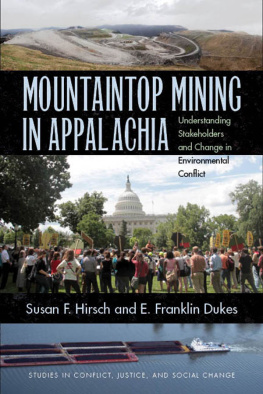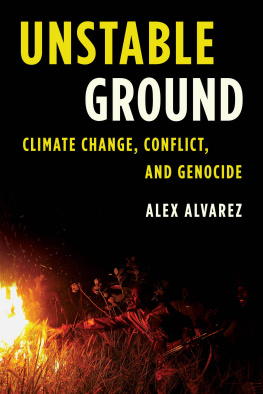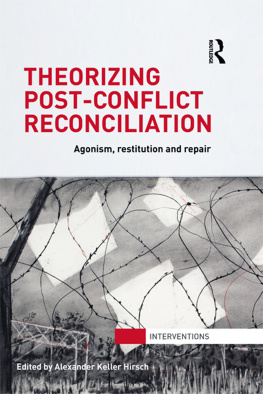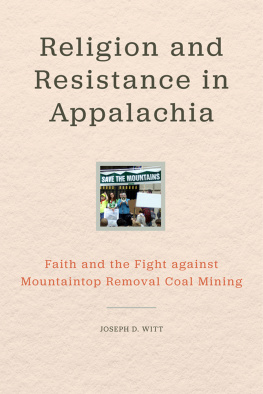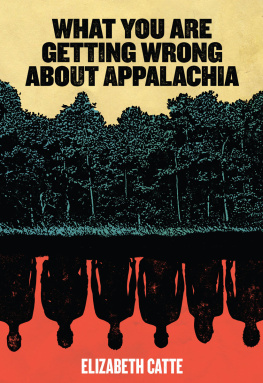Mountaintop Mining in Appalachia
Studies in Conflict, Justice, and Social Change
Series Editors: Susan F. Hirsch and Agnieszka Paczy n ska
This series is funded in part through the generous support of the
School for Conflict Analysis and Resolution at George Mason University.
Susan F. Hirsch and E. Franklin Dukes, Mountaintop Mining in Appalachia: Understanding Stakeholders and Change in Environmental Conflict
Mountaintop Mining in A p p a la chia
Understanding Stakeholders and Change in Environmental Conflict
Susan F. Hirsch and E. Franklin Dukes
Ohio University Press, Athens
To everyone who
works to create and
sustain a place
they call home.
Acknowledgments
Mountaintop mining, and the conflict over the practice, affects many people in profound ways. For this book, which seeks to explain how stakeholders experience this issue, we have relied on the help of many individuals who are involved firsthand in the situation. We acknowledge with appreciation the generosity and candor of peoplefrom activists to regulators to industry personnel to educators to community leaderswho spoke to us about their involvement in the conflict over mountaintop mining. We are especially grateful to have spoken with many residents of the coal-pro ducing region and learned about their lives and concerns. We choose not to identify by name the many people with whom we interacted while working on this project; however, we remember Larry Gibson and Judy Bonds, who were generous in sharing their perspectives. We also thank the many participants in the Clinch River Valley Initiative (CRVI), featured in chapter , and Franks CRVI cofacilitator, Christine Gyovai.
We benefited from students, colleagues, family members, and friends who helped with the research and editing of the book, including Maria Dolores Rodriguez, Gina Cerasani, Caroline Sarkis, Derek Sweetman, and the Writing Guild, a group of faculty and graduate students at George Mason University. Thanks to Michael English for careful preparation of the index. Agnieszka Paczynska, coeditor of the series in which this book appears, made excellent editorial suggestions. Michael Sullivan provided both technical and editorial advice, as well as invaluable support. Jim Lance shepherded the project in its early days. Working with Gillian Berchowitz in her capacity as director of Ohio University Press has been delightful and rewarding, and the press staff and copyeditor have made publication a smooth process. Finally, we are also grateful for support from the School for Conflict Analysis and Resolution at George Mason University and the Institute for Environmental Negotiation at the University of Virginia.
Abbreviations
CAFHP Central Appalachia Food Heritage Project
CRMW Coal River Mountain Watch
CRVI Clinch River Valley Initiative
CWA Clean Water Act of 1972
EIS Environmental Impact Statement
FACES [of Coal] Federation for American Coal, Energy and Security
IEN Institute for Environmental Negotiation, University of Virginia
MJS Mountain Justice Summer
MSHA Mine Safety and Health Academy
MTM mountaintop mining
MTR mountaintop removal mining
NWP Nationwide Permit
SMCRA Surface Mining Control and Reclamation Act of 1977
SOAR Shaping Our Appalachian Region
TNC The Nature Conservancy
USACE US Army Corps of Engineers
VNRLI Virginia Natural Resources Leadership Institute
WVCA West Virginia Coal Association
Areas in Appalachia profiled for this book. Tad Slawecki.
1: Introduction
The Bands Play On
As the band finished its last song on Labor Day 2009 , couples reluctantly turned toward their cars. Many families had already returned home to put tired kids to bed. Rock-legend-turned-hunter-and-conservative-icon Ted Nugent and his band had blasted familiar music as the final act of an all-day concert on a large fieldonce the site of a surface minein southwestern West Virginia. The free concert, which had also featured Hank Williams Jr., provided welcome entertainment for the crowd of mostly coal miners and their families. Despite the blistering heat of the late summer day, they had rocked to the music and enjoyed eating barbecue and drinking cold beer and soft drinks from the food stands. Some wore shirts bearing the name of their mining company or the increasingly popular Friends of Coal logo. Concert organizers called the afternoon of performances and speeches the Friends of America rally, and it proved to be a welcome diversion for these working people.
Mining coal in Appalachia is not an easy way to make a living. Miners daily face the threat of injury or worse, and the mining industrys apparently increasing vulnerability to economic competition and environmental concerns in an unstable economy creates anxiety for everyone. Many people attending the concert came from families in which men had proudly made their living mining coal for several generations. By sponsoring the rally, the coal companies were not only demonstrating their generosity but also showing miners that they counted on their loyalty, and many miners believed in the messageshouted out by Ted Nugentthat the coal industry would provide them with jobs for a long time (Cooper 2009 ).
Earlier that same summer, a different group of people gathered not far away, in North Carolina, to enjoy music. In coming together, their goal was to support the movement against a type of surface coal mining sometimes known as mountaintop removal mining (MTR). Concert attendees came from across the United States and included young people who had traveled to the region for the summer to support local anti-MTR activists. Many in the audience were Appalachians of diverse ages and backgrounds who had concerns about the impacts to their communities from MTR. Together, they danced and sang to the strains of country music, folk, and rock interspersed with speeches designed to fire them up for more action against the MTR side of the coal industry.
Country music star Kathy Mattea not only wowed the crowd with her vocals but urged those present to work against MTR. Banners and T-shirts displayed names of the many organizations that had long sought to draw attention to controversial coal-mining practices, including Ohio Valley Environmental Coalition, Kentuckians for the Commonwealth, Sierra Club, and Southern Appalachian Mountain Stewards. Everyone enjoyed socializing that day, and organizers hoped to raise enough money to help relocate a West Virginia school sitting directly downstream from an earthen dam holding back millions of gallons of mine waste. Although the fight against MTR had been going on for years, and mining had consumed ever larger areas of West Virginia, Virginia, and Kentucky, those who opposed MTR sensed that their issue was on the verge of gaining the attention and sympathy of a national audience (HuntingtonNews 2009 ).
Before and after both concerts, individuals representing these starkly distinct perspectivesthose who support MTR and those who oppose ithad confronted one another face to face on many different occasions. Whenever they did, tensions ran high. Many times violence threatened to break out and sometimes it did. In some instancesfor example, at a hearing over whether a coal company should receive a permit for MTRthose attending were well aware not only of the tension but also that the future of coal mining in the region was at stake (Ward 2009 ).

